Search Results for Tag: Hypoxia
“Hypoxia expedition” successfully completed
And suddenly the call came from space: “Here is Alex”. At first Ralf Dujmovits did not know who was talking at the other end of the telephone line: “Alex? Then I suddenly recognized the voice I had heard two days earlier during the broadcast of the rocket launch.” Alexander Gerst inquired from the International Space Station (ISS) about the condition of the German climber and his Canadian partner Nancy Hansen in the hypoxia chamber of the German Aerospace Center (DLR) in Cologne. “It sounded like he was sitting next door.” For a quarter of an hour, Ralf, the first and so far only German climber to have scaled all 14 eight-thousanders, spoke to “Astro Alex”, the first German astronaut to take command of the ISS. “He was very interested in our experience in the lab. That was great.” Of course, Nancy talked to Gerst too. For both climbers it was a “real highlight”, says the 49-year-old Canadian.
![]() read more
read more
Prince and princess in the hypoxia chamber
Bottled oxygen on a mountain has always been out of the question for me. On principle. Today I made an exception – for a “virtual mountain”. To be able to visit Ralf Dujmovits, the only German mountaineer who has scaled all 14 eight-thousanders, and his partner, the Canadian climber Nancy Hansen, it is mandatory to use a breathing mask. After two weeks in the hypoxia chamber of the German Aerospace Center (DLR) in Cologne, the two test persons have reached the simulated target altitude of 7,112 meters. The percentage of oxygen in the air, normally 21 percent, was gradually reduced to eight percent by adding nitrogen. “It’s like climbing a mountain. The acclimatization is almost done, now we’re heading for the summit,” says Ralf. “The time on the summit will be of course much longer.”
![]() read more
read more
Dujmovits: “We are in good hands here”
The doors have closed behind Ralf Dujmovits and Nancy Hansen. The so far only German climber who has scaled all 14 eight-thousanders and his Canadian partner moved in a 110-square-meter hypoxia chamber of the German Aerospace Center (DLR) in Cologne on Tuesday. As reported, the two mountaineers are participating in a study conducted by DLR in cooperation with the University of Texas to investigate whether extreme hypoxia can also have a positive side effect for human beings. US researchers from Texas found in two experiments with mice that heart muscle cells devided when the animals were exposed for two weeks to oxygen deficiency corresponding to conditions at 7,000 m. In mice which had previously been triggered myocardial infarctions, cardiac function improved after two weeks of hypoxia.
Medical control around the clock
Ralf and Nancy, both healthy, are the subjects of the pilot study. They are to stay in the hypoxia chamber for about a month. In the first few weeks, acclimatization as on a Himalayan expedition is simulated. The oxygen percentage in the air will be gradually lowered and temporarily increased only twice in between – as if the two climbers would descend again to breathe thicker air. The last two weeks, the 56-year-old German and the 49-year-old Canadian are to spend in a simulated height of 7,000 meters. The experiment can be stopped at any time in case serious problems arise. A DLR research team monitors Dujmovits’ and Hansen’s state of health around the clock. The daily schedule includes heart and lung function checks, blood and urine tests, fitness checks and so-called “cognition tests”, which check the reaction and perception of the subjects.
Yesterday, I visited the two climbers in their new “home”. That was possible on Wednesday for the last time without breathing mask. After more than half hour in a simulated altitude of about 3,700 meters, I felt a little bit dizzy. I preferred to do the interview with Ralf subsequently in thick air, by phone.
Ralf, you can not get out, there is no daylight, and the oxygen is lowered. That does not sound like a holiday apartment.
![]() read more
read more
Two weeks on a quasi-7000er
This seven-thousander has neither a summit, nor does it offer impressive views. It covers an area of only around 110 square meters – and is located on the grounds of the German Aerospace Center (DLR) in Cologne. A hypoxia chamber within DLR’s medical research lab “:envihab” – the name stands for environment and habitat – will be comfortably furnished in the coming months.
Four weeks in the chamber
In mid-May, Ralf Dujmovits, the only German mountaineer who has climbed all 14 eight-thousanders, and his partner, the Canadian climber Nancy Hansen, will move in there for four weeks. They are taking part in a highly interesting hypoxia study conducted by DLR in cooperation with the University of Texas. The assumption: Although extreme oxygen deficiency threatens life, there could also be a positive effect on the body.
![]() read more
read more



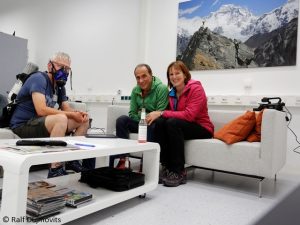

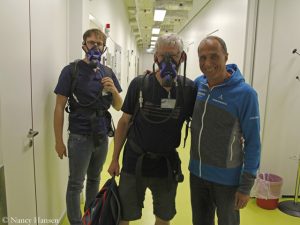
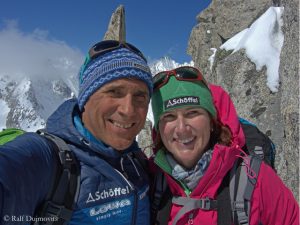
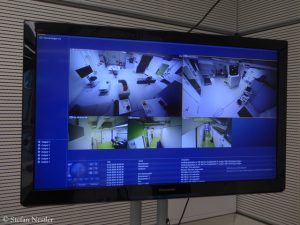
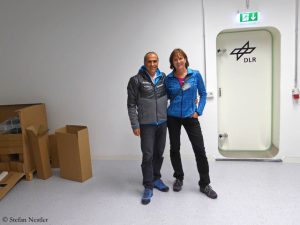
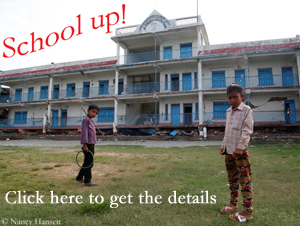
Feedback